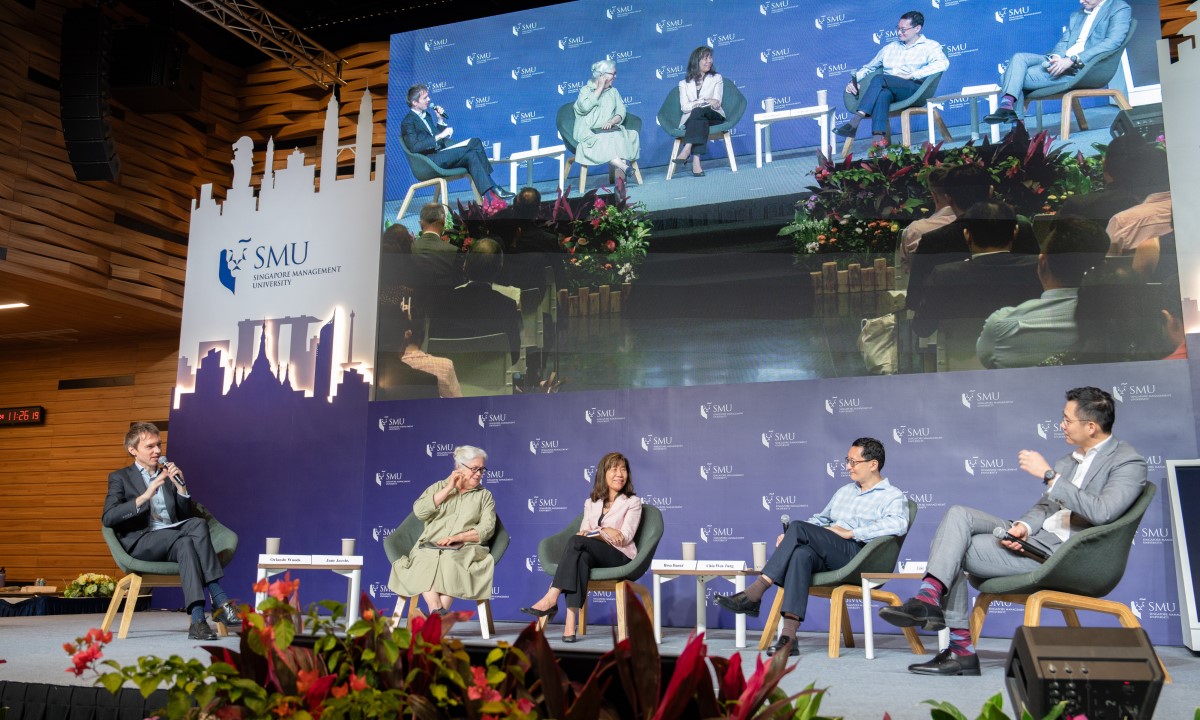Reconciling the costs of sustainable cities at SMU City Dialogues 2024

Creating sustainable cities demands large initial investments, but the benefits of these sustainable cities often take many years to materialise. This challenge was the inspiration behind the theme for the SMU City Dialogue session hosted on 18 January 2024.
Held the day following the launch of SMU’s Urban Institute, this was the second event to be held in the SMU City Dialogue series.
The topic, “Reconciling the Costs of Sustainable Cities”, brought together local and global stakeholders from the private sector, government, and academia to share ideas and best practices in tackling some of the key challenges that cities face today.
“It is truly an honour for SMU to host so many global experts to discuss one of the most urgent challenges facing humanity and the planet, and explore avenues for collaboration between industry, governments and academia to foster the sustainable growth of cities,” said Professor Lily Kong, President of SMU in her welcome remarks.
Prof Kong went on to expand on the challenges which formed the backdrop against which the SMU City Dialogues series was first created back in 2019. With cities around the world facing similar problems multiplying and getting more complex, SMU saw the opportunity for cities to learn from one another and produce solutions together, even though individual cities have their own peculiarities.

As part of the event, Prof Kong expressed her hopes that participants would work together to formulate specific, practical, and implementable recommendations and proposals to reconcile the costs and benefits of sustainable cities and explore ways to work collaboratively towards a more sustainable future.
“These proposals will be shared publicly with the relevant parties who have significant influence in the areas under review,” Prof Kong stated. “We will also encourage participants to commit themselves and the organisations they represent to promoting the execution of these proposals.”
The many pieces to the puzzle of sustainable city-building
Giving the Keynote Address was Dr Fauziah Zen, Chief Economist of the Nusantara Capital City Authority, a cabinet-level agency formed by the Indonesian government to manage and govern Indonesia’s future capital city. In her address, Dr Zen touched on some of the development principles behind Nusantara, as well as the focus on sustainability in its planning and development.

“We understand that the climate system is interdependent, hence building a sustainable Nusantara entails the preservation of the environment in all regions of Indonesia. “Nusantara should serve as a model city and a driver for sustainability,” remarked Dr Zen.
The keynote address went on to cover some of the responsibilities that the Nusantara Capital City Authority had undertaken to demonstrate their commitment towards sustainability, such as the formation of an ESG committee to help align Nusantara’s planning and decision-making with ESG principles – a first for Indonesia’s cities. In addition, it was announced at COP-28 in Dubai that Nusantara would be the first city in Indonesia to have a net-zero strategy.
Some additional information on the long-term plan for moving Indonesia’s capital to Nusantara was underlined during the address, giving attendees rare insight into the considerations in place when moving a country’s capital city – something not often undertaken due to the move’s complexity and challenges.
Following this keynote address was a panel session, moderated by Associate Professor Li Jing from SMU’s School of Economics. The panel comprised Mrs Rewinnita Maretnoningtyas, advisor to Deputy for Funding & Investment, Nusantara Capital City Authority; Professor Stephen Cairns, Professor, Urban Design, Monash University, Indonesia/ETH Zurich; Associate Professor Eka Permanasari, Associate Professor, Urban Design, Monash University, Indonesia; Assistant Professor Fa Likitswat, Lecturer, Landscape Architecture Program, Faculty of Architecture and Planning, Thammasat University Thailand; and Ms Pritha Hariram, Head of Department, Water Infrastructure and Climate Adaptation, Ramboll.

Panellists held a passionate discussion about the need to be forward thinking on how to weigh social costs with monetary costs, as well as the need for redundancy in designing infrastructure within cities.
Drawing from examples such as Bishan Park in Singapore, which uses a floodplain concept to help channel water downstream in periods of high precipitation, the panel also touched on the importance of planning for adaptation associated with urban development.
In the afternoon, participants were divided into smaller focus groups where they could exchange their own viewpoints and explore ways to work collaboratively towards a more sustainable future. These insights will be used to produce in depth analysis to follow the points and concepts generated during these discussions.


